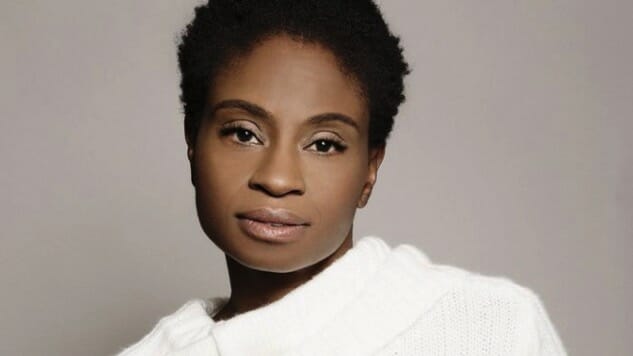Adina Porter on Underground and the Badassery of Freedom Fighters

Adina Porter is one of those wonderful character actors who’s been popping up with increasing frequency on every great TV show of the past 20 years. But in about half that time, the 45-year-old has been gaining even more recognition through some high profile recurring roles, such as her turn as Lettie Mae in HBO’s True Blood, and, of late, as the leader of a Grounder clan in the post-apocalyptic sci-fi hit The 100.
Great as those parts were, one of the most challenging and intense roles that Porter has taken on recently is that of Pearly Mae in the WGN drama Underground. The series, which centers on the building of the Underground Railroad in pre-Civil War America, joins recent efforts like 12 Years A Slave and the upcoming remake of Roots (set to air in May), in keeping the truth about slavery in the American consciousness.
While the horrors of that time period are represented unblinkingly on Underground, it is also by far the most traditionally entertaining of the bunch, building as it is toward a group of slaves potentially escaping their captors and heading south. Key to their efforts is the help of Porter’s character, a wife and mother with the rare skills of being able to read and write. Her services to help forge papers for the escapees and to read—and sing—the hymn that features the clues that will guide these people to freedom becomes more and more essential to the cause as the series rolls forward.
After filming wrapped for The Jury, a pilot ordered by ABC, Porter spoke with Paste about the challenges of playing a role like Pearly Mae and how her family’s past has informed her take on this character.
Paste Magazine: How did this role come to you? Did the producers seek you out, or did you see a script and knew you had to be a part of it?
Adina Porter: I auditioned for it. I have worked for the director and one of the executive producers, Anthony Hemingway, in at least two other projects, True Blood and The Newsroom. I knew how wonderful of a director he was. And he’s a fan, so [I always] want to audition for someone who already likes my work, it’s always good to keep them happy, or keep them as a fan. For the longest time, my agents were trying to get me in on the role of Ernestine, but the creators really wanted to explore the dynamics of dark-skinned field workers, and light-skinned house servants and that drama. I’m a good actor, but I could only be one. I came in and auditioned for Ernestine, and they saw the kind of actor that I was. Then they said, “Can you sing?” And I said, “Well, I can carry a tune.” So they wanted me to come in for the role of Pearly Mae. I learned later on that only I came in for the role, and only I auditioned for it, so I was the one and only.
-

-

-

-

-

-

-

-

-

-

-

-

-

-

-

-

-

-

-

-

-

-

-

-

-

-

-

-

-

-

-

-

-

-

-

-

-

-

-

-








































